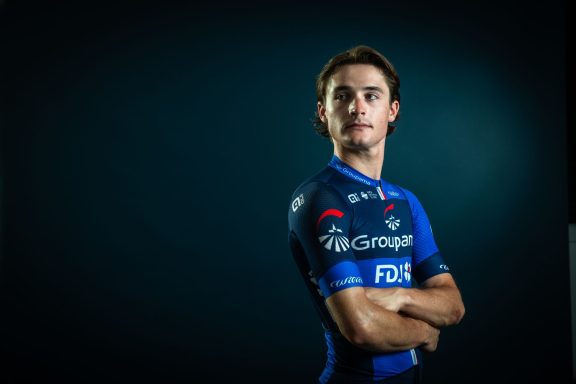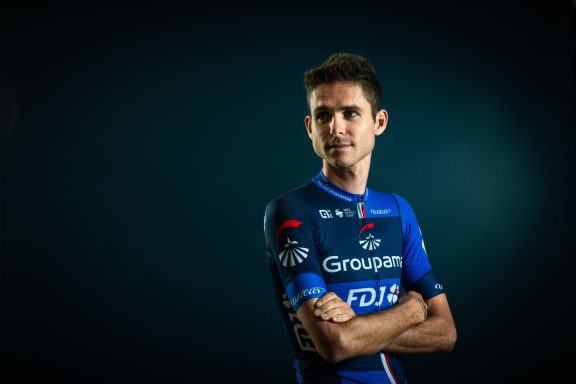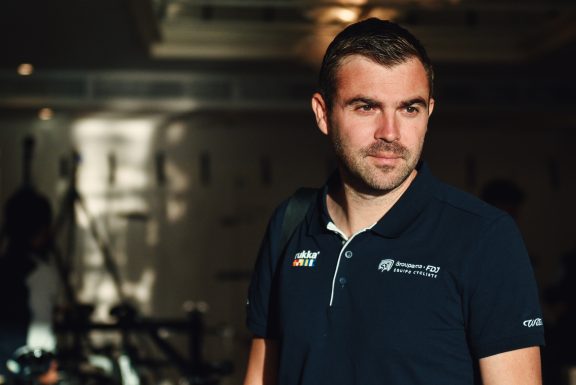The “Conti” Groupama-FDJ entered its third season three months ago. Without a doubt, it is already the best one of its – short – history. Quite successful since early March, the team located in Besançon has reached more than one milestone in recent weeks. Until now, its 2021 record is made up of five victories, including four in Class 2, nine additional podiums, including its first one in Class 1 (Circuit de Wallonie), and the structure has also enabled the youngsters to show themselves with the “big boys”. It was therefore time to take stock with the team’s manager, Jens Blatter.
Jens, how do you assess the Conti’s season after three months of racing?
The record so far is very, very good. We launched the Conti from a clean sheet and we always said that our goal was to become the best development team within three years. After two and a half years, we are on the right track to achieve this goal. Considering our results over the last three months, I think we can even say that we are close to meeting our expectations. That being said, the goal is to continue to deliver this kind of result in the second part of the season with races like the Baby Giro or the Giro della Valle d’Aosta.
“Everyone has got a very high level”
Did you expect such a high level of performance?
Yes, I feel that our results since the start of the season really meet our initial expectations. From the February training camp, we could see that everyone was going very strong. It’s kind of logical as well. If the overall level of the team increases, it pushes everyone to do more, and better. Everyone knows that we don’t have space for twelve riders in the WorldTeam, so each of them is trying to be in the top of the heap. It certainly gives even more motivation to the youngsters to train well, to eat well, to pay attention to every detail, and that’s also what makes them improve quickly.
In itself, the team is therefore stronger than it was in the past.
Absolutely, the average level is higher than the previous two years. All riders are riding strong. I don’t see anyone way above the rest. Everyone is extremely ready and everyone has got a very high level. It also helps us in regard with the exchanges with the WorldTeam. We don’t have to think too much. We know that all riders are able to ride with the “big boys”. It’s easier for us, but it’s also a good thing for the youngsters, as they feel that we have confidence in them and that we line them up with the WorldTeam without a doubt.
How important are these exchanges in your recent success?
They obviously have an impact. I was talking to the manager of another development team lately, and he told me that they hadn’t had any races before the Baby Giro. As for us, we have been lucky to have a lot of races in the last few weeks, but even when we didn’t, we had the opportunity to send one or two riders with the WorldTeam. It helped us big time since it allowed our riders to continue racing, at a higher level moreover. We also notice that when they have the opportunity to race with the WorldTeam, they are not there to fill in the gaps. Sometimes they even have their chance! Obviously, sometimes they have to help the team like Alexandre [Balme] or Antoine [Raugel] did in Valencia, but there is always a possibility to show themselves, as Lewis [Askey], Antoine [Raugel], Marijn [van den Berg], or Reuben [Thompson] have shown. Within the Groupama-FDJ structure, everyone plays along and our youngsters are not selected in the last resort. It also shows that they actually have the required level.
“Proud of everyone’s work”
After a year 2020 disturbed by the Covid-19 pandemic, how important has it been that the riders could live together in Besançon again?
The fact that the youngsters are now all together at the Performance Centre in Besançon, living in the same place, has made it possible to create a real team. One evening, one rider makes dinner, the next day it’s up to another one. That’s how we can build a real group, and I don’t forget everything that is implemented by the staff. This overall work pays off today. Every Monday afternoon, for example, we hold a debriefing of the past week’s races. Even with the very good results of the last few months, we have noticed many small mistakes, and these sessions benefit everyone, not just the six riders who were actually racing. It’s something new that really helped us and that also partly explains our good results. We improved in many areas to get to that point.
After two and a half years, would you say that the Conti has found its best way of working?
Absolutely. Of course, there is always room for improvement, but I believe that now we have found the right operation for everyone. I was sure we would reach that level, but I have to admit that I’m a little surprised we got there so early. After a particular year 2020, I thought we would get to our goal in four years rather than three. Having said that, I am also realistic. We know that the second half of the season for the U23 is always completely different from the first. Until then, we were more focused on flat, sprint races, and we have shown that we are very strong in this area. From now on, we enter the “climbers” chapter with the Baby Giro, the Giro della Valle d’Aosta, the Tour Alsace, the Ronde de l’Isard. We don’t know how it’s going to go, but I think we have a great team from that point of view as well and I hope we’ll keep the momentum. When I looked at the team classification of the UCI recently (37th, first development team, editor’s note), I felt really satisfied. It made me proud of everyone’s work, staff and riders.
Are the latest results making you more demanding?
As athletes, competitors, we obviously like to win races. The more we win, the more we want to win. However, I also believe that with our recent successes, things also become harder. Until then, eyes weren’t too much on us as we only had a few wins under our belt. After the last three months, people look much more at the Conti Groupama-FDJ at the start of the races and we have to take more responsibility. That’s part of the game, but it shows more than anything that we are doing good work.
“You can’t always be a leader”
Despite the current momentum, is the riders’ development still more important than the results?
For me, and for us, the most important thing remains to develop the youngsters for a potential access to the WorldTour. Having said that, if you do a good job and the training course goes well, it naturally leads to results on paper. I’m not worried in that regard. Plus, I find it always easier to have this developing process if you are successful. If you don’t get results, the rider can start to wonder about the team and its way of working. One thing I can fear, however, is that the competition within the team will become too hard. Of course, everyone is there to improve, but everyone has one goal eventually: to go WorldTour. But there is no room for everyone. When the success comes, you have to be able to manage this aspect and make sure the team remains united.
Is it something you need to warn the riders about?
One of the biggest challenges for us is to keep everyone together towards the same goal. We constantly speak about this with them. As I often say, the pressure doesn’t come from us. It comes from themselves, or sometimes from the people close to the rider. When we make plans for race and name this or this rider as the leader, everyone agrees. However, between the briefing and the race itself, other people can interfere… This can sometimes destabilize the youngsters. We often take riders like Clément Davy or Kevin Geniets as examples. Clément thrives as a teammate. Kevin hadn’t won with the Conti, but it doesn’t prevent him from going strong in the WorldTour. With these examples, we try to make young people understand that results don’t mean everything. You can’t always be a leader, especially at that age. Having said that, it is true that my goal is to sign the best. But if you sign the best, you often have riders who have the potential to be leaders. It’s a bit of a risk, but it’s also something we need to further explore in their development.
Is it sometimes complicated to name this or that rider a leader?
Of course, it can be sometimes, but everything goes smoothly if the runner has a common thread and precise schedule. One week before the Giro, we know who will be our leaders. It’s okay for the others, as they will have other opportunities to show themselves. The riders need to know where their personal goals lie and where they will have the opportunity to be a leader or a protected rider. The goal is therefore to be precise upstream so that the riders know what to expect. Communication is very important in these cases. We have twelve of the best U23 riders within our squad. Everyone is able to be a leader, but everyone should also do the domestique work from time to time. It’s up to us to make it clear to them that this is a part of their learning and development. If a youngster makes it to the WorldTour, unless he’s Evenepoel or Bernal, he would usually start as a teammate. We have to keep this in mind.
We also feel the team’s reputation is increasing a lot these days.
Absolutely. When the Conti was created, people didn’t know us, and over the months, we made a name for ourselves. We have a very good 2021 roster and we continue to receive, on a daily-basis, applications to join us in 2022. There are more and more of them, and the quality also gets better and better. The youngsters see the dual project the Conti can offer, with possible exchanges with the WorldTour. They also notice that each year, several riders join the “A” team, which is another motivation to join us. Now, the best want to come to our team and there are more and more national champions or international medallists who are contacting us. The team is bound to become stronger and stronger.


